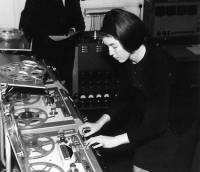
Delia Ann Derbyshire was an English musician and composer of electronic music. She is best known for her pioneering work with the BBC Radiophonic Workshop during the 1960s, particularly her popular electronic arrangement of the theme music to the British science-fiction television series Doctor Who. She has been referred to as "the unsung heroine of British electronic music."
Paddy Kingsland is a composer of electronic music best known for his incidental music for science fiction series on BBC radio and television whilst working at the BBC Radiophonic Workshop. Educated at Eggars Grammar School, Alton, in Hampshire, he joined the BBC as a tape editor before moving on to become a studio manager for BBC Radio 1. In 1970 he joined the Radiophonic Workshop where he remained until 1981. His initial work was mostly signature tunes for BBC radio and TV programmes before going on to record incidental music for programmes including The Changes, two versions of The Hitchhiker's Guide to the Galaxy, as well as several serials of Doctor Who. His work on the latter series included incidental music for several serials in the early 1980s.
Peter Howell is a musician and composer. He is best known for his work on Doctor Who as a member of the BBC Radiophonic Workshop.
Dudley George Simpson was an Australian composer and conductor. He was the Principal Conductor of the Royal Opera House orchestra for three years, although he is best known for his work as a composer on British television, especially his long association with the BBC science-fiction series Doctor Who, for which he composed incidental music during the 1960s and 1970s.
Roger Limb is a British composer, specialising in electronic music. He is best known for his work on the television series Doctor Who whilst at the BBC Radiophonic Workshop. He joined the BBC as a studio manager, before going on to become a television announcer. In 1972 he left this position to join the Radiophonic Workshop, where he remained until 1995. Although he had received formal music training, he also spent much time in pop and jazz bands, the influence of which can be heard in much of his music.
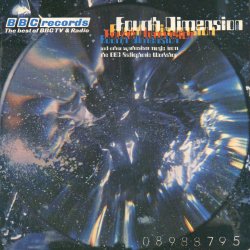
Fourth Dimension is a 1973 BBC Records release featuring recordings created by the BBC Radiophonic Workshop composer Paddy Kingsland. Although it was credited to "The BBC Radiophonic Workshop" it was the work of Kingsland alone, and was the first album of Workshop music to feature only one artist. It features theme tunes used by BBC radio and television. The music prominently features VCS 3 and "Delaware" Synthi 100 synthesisers, both from Electronic Music Studios (London) Ltd, with a standard rock-based session band providing backing. The track "Reg" featured as the B-side to the 1973 single release of the Doctor Who theme.
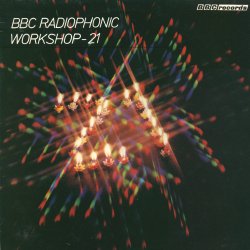
BBC Radiophonic Workshop – 21 is a compilation by the BBC Radiophonic Workshop to celebrate their 21st anniversary in 1979. It was compiled as an overview of their work both old and new, showcasing the changes in the Workshop as they developed from backroom sound effects suppliers for BBC Radio to full-fledged in-house music composers for the whole of the corporation. It demonstrates the move from the musique concrète and tape-manipulation techniques used in the early days, to the synthesiser works of the 1970s. The first side of the album consisted of material from 1958 to 1971, covering their early work creating jingles, sound-effects and some incidental music. This side includes the first material by Workshop founder Desmond Briscoe to be commercially released, as well as sound effects from The Goon Show, Maddalena Fagandini's interval signal that later became "Time Beat", some of Delia Derbyshire's experimental work and the pilot episode version of the Doctor Who theme music. The second side of the record covered the period between 1971–1979, including Richard Yeoman-Clark material from popular BBC series Blake's 7 and Peter Howell's vocoder heavy "Greenwich Chorus" theme for The Body in Question. It was reissued on CD by Silva Screen Records on 22 April 2016.
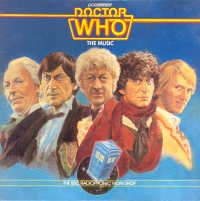
Doctor Who: The Music is a 1983 compilation of music from the BBC Radiophonic Workshop featuring incidental music from the popular science-fiction television series Doctor Who. The album was the first full-length to feature solely music from the programme. The collection was produced by Workshop member and long-time Doctor Who sound-effects creator Dick Mills. It featured the original Delia Derbyshire arrangement of Ron Grainer's theme tune and music by Malcolm Clarke from the 1972 serial "The Sea Devils", which was only the second to have an incidental score provided completely by the Radiophonic Workshop. Most of the music included came from serials from the previous three years to demonstrate the recent composers' works. For the album, each serial's incidental music was reassembled into short "suites" and although most of the music had been recorded in mono it was, for this compilation, remixed into stereo with sound effects added on to some tracks. The album was re-released in 1992 by Silva Screen records as Earthshock - Classic Music From The BBC Radiophonic Workshop Volume 1, with bonus tracks including "The World of Doctor Who", a track recorded by Mills as a B-side to Dudley Simpson's 1973 "Moonbase 3" single, which featured a mix of music from the serial "The Mind of Evil" with sound effects from "Planet of the Daleks" before finishing with Simpson's "Master's Theme". Selections from both this compilation and its follow-up, Doctor Who - The Music II, were also re-used on the 1994 Silva Screen compilation The Best Of Doctor Who Volume 1 - The Five Doctors.

The Soundhouse is a 1983 compilation released by BBC Records of music from the BBC Radiophonic Workshop. It featured music composed at the Workshop in the period since the previous compilation, BBC Radiophonic Workshop - 21. During the gap between releases, many advances had been made in the use of computer technology to produce electronic music and this was reflected on the compilation with much of the material having been performed using the Fairlight CMI, the first digital sampling synthesiser. The album included two tracks by Paddy Kingsland used in the television version of The Hitchhiker's Guide to the Galaxy, three electronic realisations of classical compositions and an original collaboration featuring five of the Radiophonic Workshop members entitled "Radiophonic Rock".
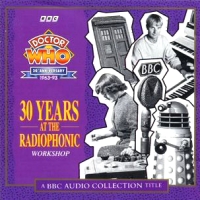
Doctor Who: 30 Years at the BBC Radiophonic Workshop is a 1993 album celebrating the 30th anniversary of popular BBC science-fiction series Doctor Who, which had been taken off the air four years previous. The compilation featured a selection of sound-effects and atmospheres from throughout the history of the programme as well as a sample of music from the 1993 BBC Radio production "The Paradise of Death". It also collected four versions of the memorable theme music, including the first official release of the unused 1972 "Delaware" version.

Doctor Who at the BBC Radiophonic Workshop Volume 1: The Early Years 1963–1969 is the first in a series of compilations of Doctor Who material recorded by the BBC Radiophonic Workshop. Compiled and remastered by Mark Ayres, the album features mostly sound effects and atmospheres from the first six years of the programme. Although some incidental music tracks do appear, most of the album's content is by original Doctor Who sound effects creator Brian Hodgson. The compilation also features three Radiophonic Workshop realisations of early Doctor Who composer Dudley Simpson's work.

Doctor Who at the BBC Radiophonic Workshop Volume 2: New Beginnings 1970–1980 is the second in a series of compilations of BBC Radiophonic Workshop music from Doctor Who. The album collected various incidental music from the 1970s including, for the first time, the complete Malcolm Clarke score for the 1972 serial The Sea Devils, only the second scored completely by the Radiophonic Workshop. The compilation also featured a few of Dudley Simpson's compositions as realised by Brian Hodgson, some Delia Derbyshire music as featured in Inferno, two Peter Howell demos from 1979 and a selection of Dick Mills' sound effects from the era.

Doctor Who at the BBC Radiophonic Workshop Volume 3: The Leisure Hive is the third in a series of compilations showcasing the BBC Radiophonic Workshop's work on the science-fiction programme Doctor Who. The album focused mainly on the Peter Howell synthesiser score for the 1980 serial The Leisure Hive, which received its first full release here. The compilation also collected some Dick Mills sound effects from the story as well as some effects from other 1980 serials Meglos and Full Circle, whose music would be the subject of the fourth volume in the series. The final track was a new remix of the original Delia Derbyshire version of the show's theme tune by series compiler Mark Ayres.
David Cain was a composer and technician for the BBC Radiophonic Workshop. He was educated at Imperial College London, where he earned a degree in mathematics. In 1963, he joined the BBC as a studio manager, specialising in radio drama. He transferred to the Radiophonic Workshop in 1967 where he composed various jingles and signature tunes as well as the complete incidental music for the BBC's radio productions of The War of the Worlds in 1967, and The Hobbit in 1968. He also produced the Workshop's 1973 adaptation of Isaac Asimov's Foundation series. He remained with the Radiophonic Workshop until 1973. His 30-second composition "Crossbeat" was used as the original theme for the Australian Broadcasting Corporation's morning radio current affairs program AM, which premiered in 1967.
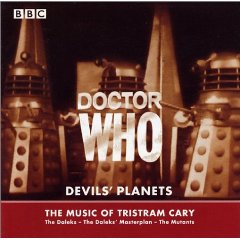
Doctor Who: Devils' Planets – The Music of Tristram Cary is a compilation of music by Tristram Cary for the television series Doctor Who. It features all the musical contributions Cary did for Doctor Who except for his music for Marco Polo and "The Ballad of the Last Chance Saloon" from The Gunfighters which was left off due to space reasons. The ballad eventually saw commercial release on the TV soundtrack release of that serial. Due to the folding of the BBC Music label, this album was available only for a limited period and now fetches high prices on auction sites such as eBay.
This is the discography of the BBC Radiophonic Workshop, a British electronic music group. It consists of releases of music and sound effects.

Sound Effects No. 13 – Death & Horror is an album produced by Mark Harding of the BBC Radiophonic Workshop and released in 1977 by BBC Records & Tapes. It is the thirteenth instalment in the label's Sound Effects series and contains over 80 sound effects related to horror and death, so that producers may use them in amateur film and stage productions. Mark Harding and label staff man Ian Richardson picked numerous "classics" from the BBC Effects Library and from the BBC Radiophonic Workshop, but also created many new sound effects for the album themselves, many of which were created by "mistreating large white cabbages." The effects are arranged throughout the album into six distinct themed sections.













